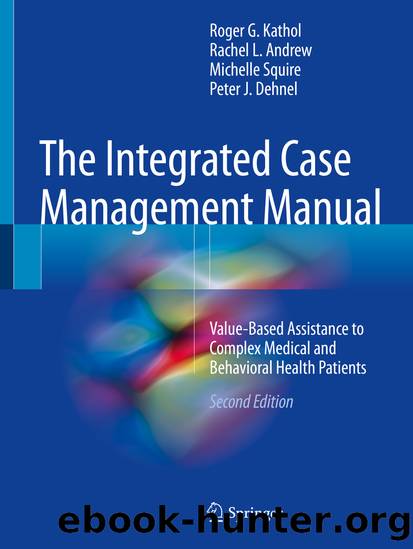The Integrated Case Management Manual by Roger G. Kathol Rachel L. Andrew Michelle Squire & Peter J. Dehnel

Author:Roger G. Kathol, Rachel L. Andrew, Michelle Squire & Peter J. Dehnel
Language: eng
Format: epub
Publisher: Springer International Publishing, Cham
Throughout the assessment process, it is imperative for VB-ICM managers to be thoughtful in their approach to ensure they are engaging each assisted individual and delivering value while gathering the necessary information needed to identify critical barriers to health improvement. Current non-VB-ICM CM models reward case managers who ask standard “closed” questions and then quickly check off boxes on an assessment form. The organizations that do this see it as an efficient process to complete assessments. In fact, they do lead to the outcomes desired by such organizations, i.e., measuring the number of individuals managed, the calls made, and/or the assessments completed. Unfortunately, they often fail to address the things considered core in VB-ICM, i.e., ultimate documentation of barrier reversal and improved individual health and life outcomes.
The VB-ICM model differs from most other currently used CM approaches. In VB-ICM, the goal is first to build a relationship with the individual so that the individual’s goals can be identified and achieved and overall health improved. The narrative assessment, i.e., a guided “discussion” with the individual, is, therefore, the process used by the VB-ICM manager to build a trusting relationship with the individual, where the individual hopefully becomes engaged in improving their health. Through this narrative, the VB-ICM manager uncovers the individual’s barriers to improvement and couples these with their true motivators for change, which will assist the individual in taking the steps needed to make sustained behavior change.
During this process, time is taken to get to know the individual as a person, not just about their conditions. With this approach, every attempt is to build true rapport. Building rapport by demonstrating respect for the individual earns the VB-ICM manager the right to work with the individual and supports sustained engagement. Individuals who feel respected are more open to hearing new information, receiving support, and taking steps to better manage their health. In the VB-ICM model, outcomes focus on more than process measures and include the following:
The ICM manager’s outreach, contact, and engagement rates
Download
This site does not store any files on its server. We only index and link to content provided by other sites. Please contact the content providers to delete copyright contents if any and email us, we'll remove relevant links or contents immediately.
The Art of Coaching by Elena Aguilar(52130)
Thinking, Fast and Slow by Kahneman Daniel(11738)
The Art of Thinking Clearly by Rolf Dobelli(9854)
The 5 Love Languages: The Secret to Love That Lasts by Gary Chapman(9227)
Mindhunter: Inside the FBI's Elite Serial Crime Unit by John E. Douglas & Mark Olshaker(8673)
When Breath Becomes Air by Paul Kalanithi(8007)
Periodization Training for Sports by Tudor Bompa(7901)
Becoming Supernatural by Dr. Joe Dispenza(7812)
Turbulence by E. J. Noyes(7682)
Bodyweight Strength Training by Jay Cardiello(7640)
Therapeutic Modalities for Musculoskeletal Injuries, 4E by Craig R. Denegar & Ethan Saliba & Susan Saliba(7589)
The Road Less Traveled by M. Scott Peck(7258)
Nudge - Improving Decisions about Health, Wealth, and Happiness by Thaler Sunstein(7216)
Mastermind: How to Think Like Sherlock Holmes by Maria Konnikova(6913)
Enlightenment Now: The Case for Reason, Science, Humanism, and Progress by Steven Pinker(6857)
Win Bigly by Scott Adams(6804)
Kaplan MCAT General Chemistry Review by Kaplan(6570)
Why We Sleep: Unlocking the Power of Sleep and Dreams by Matthew Walker(6327)
The Way of Zen by Alan W. Watts(6271)
